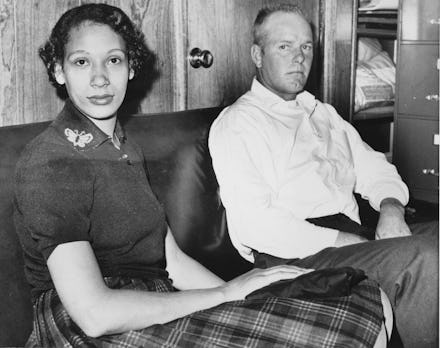Interracial marriage is more common than ever, new study shows

It's been 50 years since the U.S. Supreme Court ruled that anti-miscegenation — Jim Crow-era laws banning interracial marriages — was unconstitutional. As a result of that ruling and increasing social acceptance, interracial marriage is more common than it has ever been in the U.S.
In 2015, an estimated 1 in 6 newlywed couples, or 17%, included people of different races and ethnicities, according to a new Pew Research Center analysis of U.S. Census Bureau data. Overall, 11 million people — or 1 in 10 married people — are interracially married.
That's a big jump from 1968, when only 3% of newlywed couples were interracial. Mildred Loving, a black woman, and her white partner, Richard Loving, helped topple anti-miscegenation in Virginia and across the nation, after the Supreme Court ruled unanimously against race-based restriction in state marriage laws. Loving v. Virginia would later be cited as precedent in the high court's historic ruling in favor of same-sex marriage.
"The rapid increases in intermarriage rates for recently married whites and blacks have played an important role in driving up the overall rate of intermarriage in the U.S," the authors of the Pew analysis wrote.
But black-and-white couples are not leaders in U.S. intermarriage, according to the Pew analysis. The Asian and Latino populations are the nation's fastest growing — and they have the highest rates of intermarriage.
In 2015, Asians were the most likely to intermarry; 29% of Asian newlyweds were hitched to someone of a different race or ethnicity. Latinos followed close behind, at 27%. Blacks and whites were intermarried at 18% and 11%, respectively.
Gender also determines how likely people were to intermarry, according to the Pew analysis. Asian women and Latinas were the most likely among women to marry outside of their race in 2015. Black and Latino men were most likely among men.
Daniel Litchter, director of the Institute for the Social Sciences at Cornell University in Ithaca, New York, told the Associated Press that the biggest reason for intermarriage is the growing diversity of the U.S. population.
"There's much greater racial tolerance in the United States, with attitudes having changed in a way where it's much more positive toward interracial marriage," Litchter, who has studied interracial and interethnic marriages, said in the AP interview. "There are just more demographic opportunities for people to marry someone of another race or ethnicity."